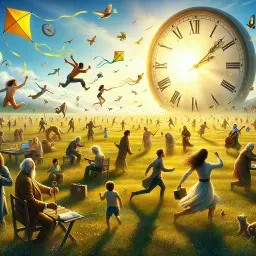Wrinkles should merely indicate where smiles have been

0
0
0
0
- Meaning
- The meaning of this phrase is quite profound. It suggests that wrinkles, often seen as undesirable signs of aging, should instead be viewed as evidence of a life filled with joy and laughter. It encourages people to appreciate and embrace the physical manifestations of their life experiences, rather than viewing them negatively. This perspective shifts the focus from superficial beauty to a deeper appreciation of the happiness one has experienced.
- Allegory
- This image captures the essence of celebrating the experiences that form our lives. The elderly person's wrinkles are highlighted to symbolize the joys and sorrows that have shaped their journey. The ghostly figures represent cherished memories, adding depth to the meaning of the phrase. The warm sunset symbolizes the acceptance and peace found in later years, while the golden light underscores the contentment and fulfillment derived from a life well-lived. This visual interpretation aligns with the message of seeing beauty in the signs of aging and valuing the experiences that contribute to who we become.
- Applicability
- In personal life, this phrase can serve as a reminder to enjoy the present and to smile often. It advocates for the idea that the memories of those happy moments are more valuable than maintaining a constantly youthful appearance. Embracing wrinkles as indicators of a well-lived life can help individuals develop a more positive attitude toward aging.
- Impact
- This phrase has had a significant cultural impact, resonating particularly with audiences who appreciate Twain's wit and wisdom. It has influenced conversations about aging, beauty, and the acceptance of natural changes over time. The embrace of this philosophy can be seen in varied cultural contexts, where people are encouraged to find beauty in the experiences that shape them, rather than striving for perpetual youth.
- Historical Context
- Mark Twain lived during the 19th and early 20th centuries, a time when societal attitudes toward aging and beauty were beginning to develop in new ways. The life expectancy was shorter, and fewer people lived to old age in good health. This period also marked significant social and technological changes, influencing how people perceived aging and life experiences.
- Criticisms
- There have been few direct criticisms of this phrase, though some might argue that it overly romanticizes aging without acknowledging the potential difficulties and health issues that come with it. Some might say that not all physical changes from aging are pleasant or linked to positive experiences, which this quote does not address.
- Variations
- In different cultures, similar sentiments about aging gracefully can be found. For instance, in Japan, the concept of “Wabi-Sabi” appreciates beauty that is imperfect, impermanent, and incomplete, seeing the value in the wear and tear that comes with age.
-

You are entitled to your own opinions, but not your own facts.
-

Time flies when you're having fun.
-

There is no beauty in the finest cloth if it makes hunger and unhappiness.
-

She walks in beauty, like the night.
-

The arc of the moral universe is long, but it bends toward justice.
-

Well-behaved women seldom make history.
-

I don't give a damn for a man that can only spell a word one way.
-

Living well is the best revenge.
-

I have not yet begun to fight!
-

If you would be loved, love, and be lovable.
No Comments